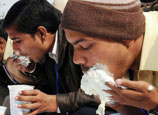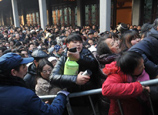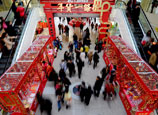
According to economists, GDP over the next decade is not likely to regain double-digit growth, Feng said, as both exports and investment may continue to see downside risks.
Long Guoqiang, director of the Research Department of Foreign Economic Relations at the center, predicted that the global economy may be better this year than in 2012, which will lead to a rise in exports to 10 percent year-on-year, compared with 7.9 percent last year.
"The changing exchange rate and increasing production costs will further weaken Chinese companies' competitiveness," said Long.
The debt ceiling debate in the United States and headwinds from the eurozone may restrain global demand and inflation could be imported as other economies ease their monetary polices, he said.
China's new leadership has pledged to focus more on the quality of development, addressing urbanization and modern agriculture as key reform areas.
Huang Yiping, chief China economist with Barclay's Capital, said that "the rebalancing of the Chinese economy is already underway".
According to the NBS data, consumption has become the largest force behind 2012 growth. It contributed 51.8 percent of the GDP increase last year, compared with 50.4 percent from capital investment.
Exports pulled down GDP growth by 2.2 percent in 2012.
However, China will take a long time to finally achieve the "new balance", Yu said as he stressed that it is unlikely the government will ease property curbs.
A report from Barclay's Capital predicted that 2013 GDP growth is likely to rebound to 8 percent, sustained by new investment projects, robust consumption and stabilizing exports.
"But we remain cautious about China's recovery given our belief that rising financial and fiscal risks, plus a pickup in inflation, will act as constraints against further policy easing," the report said.
chenjia1@chinadaily.com.cn

















 'Collective children's weddings' held in kindergarten
'Collective children's weddings' held in kindergarten


![]()
